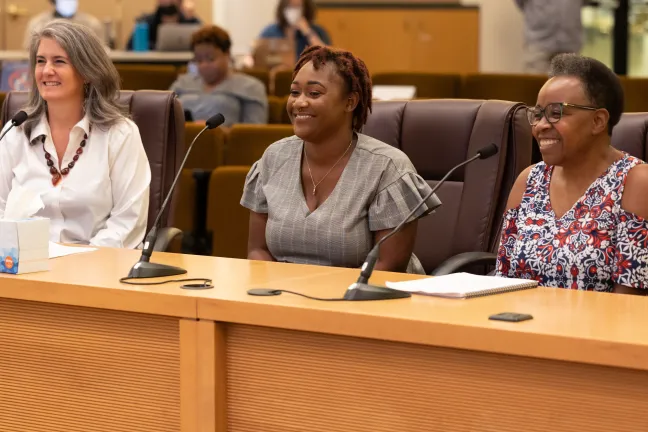On Thursday, Sept. 8, the Multnomah County Board of Commissioners proclaimed September 2022 as Infant Mortality Awareness Month in Multnomah County, recognizing County programs that educate the community, provide support and health care access for families, and ensure that babies thrive during their first year of life.
September also marks the National Infant Mortality Awareness Month, a campaign sponsored by the National Healthy Start Association, focusing on raising awareness on the number of infants who die before making it to their first birthday and celebrating ongoing programs and current efforts to reduce infant mortality.
Community partners and programs working in Multnomah County to reduce the infant mortality rate and provide support include the Multnomah County Health Department’s Parent Child Family Health (PCFH) Services, Healthy Birth Initiatives (HBI), the African Family Holistic Health Organization (AFHHO) and Future Generations Collaborative (FGC).
While Infant Mortality Awareness Month month provides an opportunity for the community to get involved with those and other programs, it also serves as a time to encourage government agencies, community-based organizations, healthcare systems and academic institutions to work together to eliminate disparities and reduce overall infant mortality rates not just locally but nationally.
Nationally, the infant mortality rate has improved. Elizabeth Carroll, Multnomah County’s interim Parent Child Family Health director, said one in ten infants died in their first year of life at the start of the 20th century, equal to 100 deaths per 1,000 live births. As of 2020, the infant mortality rate was 5.8 per 1,000 live births.
“Sadly, this improvement has been anything but equitable,” said Carroll.
In Multnomah County, 2018-20 data shows that non-Hispanic Black/African American families experience the highest infant mortality rate among racial and ethnic groups, 11 per 1,000 live births, almost double the national rate and roughly four times the rate for white infants in Multnomah County.
Carroll said racism, systemic violence and genocidal policies targeting communities of color have left long, generational impacts, including high infant mortality rates.
Programs like Multnomah County’s Healthy Birth Initiatives are working to reduce disparities in maternal and infant mortality.
Leading with race, the program works in the community, providing access to healthcare and supporting pregnant Black and African American individuals along with their families. This culturally specific program provides Black pregnant families with services including in-home case management, respite care, family planning, breastfeeding support, childbirth classes and more.
Program Specialist Desha Reed said that regardless of social and economic status, being African American immediately puts mothers and babies at risk.
“This is the only reason our program exists,” said Reed. And unlike other programs, Healthy Birth Initiatives is open to all pregnant African American individuals in Multnomah County.
One of the program’s partners is the African Family Holistic Health Organization, which works with African refugees and immigrants in maternal health to provide the same support to the community.
Often, immigrant and refugee families at the African Family Holistic Health Organization speak another language other than English as their first language. The organization works to partner families with doulas who speak their language and who can accompany them through the healthcare system.
Doulas can help relieve some of the stress from their clients, providing prenatal training and preparing them for when they go into labor at a hospital.
“It doesn’t matter where you are from,” said Lillian Olero with the African Family Holistic Health Organization. “We match you with somebody who speaks your language.”
Healthy Birth Initiatives also provides access to healthcare for families by meeting with local providers. Program staff meet regularly with Providence Health and Legacy Health to discuss how to make services for families more equitable.
Currently, Providence Health is recruiting staff and adding training to increase ethnic and cultural diversity in doula support, while also removing costs to allow more families to receive this opportunity.
Violet Larry, a nurse supervisor and Healthy Birth Initiatives program manager said, “Our community partners are our village.”
Other community partnerships include the Future Generations Collaborative, a community-based organization that serves the Indigenous community and provides resources and programs to generate a healthy, healing and growing Indigenous community.
The collaborative’s Jennifer Pirtle said American Indian/Alaskan Natives are more likely to have low birthweight and/or be born preterm when compared with non-Hispanic white babies.
In 2018-20, the low birthweight rate for American Indian/Alaskan Natives in Multnomah County was 8.1 per 1,000 live births, and with a preterm birth rate of 17.1. That compares to a low birthweight rate of 5.7 births for white non-Hispanic babies and a preterm birth rate of 7.3.
The collaborative has a program, Chau Manqui, or “Help Me Grow,” that works to better serve families with information, but in a culturally congruent way.
Erin Angus with Chau Manqui said the program creates a comfortable environment where families can access play groups, virtual and in-person parenting circles, individual family supports, and other services that connect families to the healthcare system.
“We know that when we work together as providers to wrap our arms around the whole family the healing is swift and truly palpable,” Angus said.
Community partners at Multnomah County play a crucial role in working to educate the community on health disparities and eliminating core drivers of those disparities.
Commissioners thanked the providers and highlighted the need to focus services on communities facing disparities in healthcare outcomes.
“I appreciate you raising awareness about the heartbreaking aspect of the mortality rates for infants in the Black and Indigenous communities,” Commissioner Sharon Meieran said.
“I’m always a big believer that the earlier that we can invest, the earlier we can support people and communities, and the more impactful and effective we are going to be,” said Commissioner Jessica Vega Pederson.
Commissioner Lori Stegmann thanked the providers for “the important work that you all do to try and make our communities healthier."

